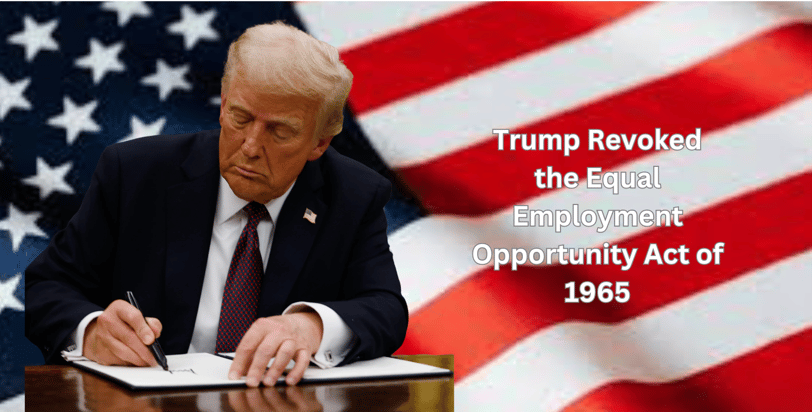The Implications of President Trump's Revocation of a 60-Year-Old Executive Order on Equal Employment Opportunity in Government Contracting
On January 22, 2025, President Trump signed an executive order revoking a 60-year-old policy requiring equal employment opportunities in government contracting, originally introduced by President Kennedy in 1961. This decision eliminates regulations that enforced nondiscrimination based on race, sex, religion, and national origin for federal contractors. The White House has framed the move as a way to reduce government intervention and simplify the contracting process for businesses. Supporters argue it will foster a merit-based system, while critics warn it could harm minority and women-owned businesses by removing the support they previously received in securing federal contracts. The revocation is expected to lead to legal challenges from civil rights groups, who believe it undermines decades of progress in promoting workplace equality. There are concerns that the decision could set a precedent, leading to the rollback of other affirmative action policies in both public and private sectors. The business community remains divided, with some welcoming deregulation and others worrying about the long-term impacts on diversity. Ultimately, this change could have significant consequences for both federal contracting practices and broader discussions on racial and gender equality in the U.S. workforce.
USA


On January 22, 2025, President Donald Trump took a controversial step by revoking a 60-year-old executive order that required federal contractors to ensure equal employment opportunities. This order, originally signed by President John F. Kennedy in 1961, was meant to promote fairness in hiring practices for government contracts by prohibiting discrimination based on race, color, religion, sex, or national origin. The move to reverse it is already sparking strong reactions, with some supporting the rollback and others fearing it could undo significant progress made in promoting diversity and equal opportunity.
Historical Context of the Executive Order
In 1961, President John F. Kennedy issued Executive Order 10925, a pivotal step toward ensuring equal employment opportunities in government contracting. This executive order mandated that contractors receiving federal funds take affirmative action to ensure that all individuals, regardless of race, color, religion, sex, or national origin, had fair access to employment. The socio-political climate of the early 1960s was marked by a growing awareness of civil rights issues, sparked by widespread activism and a desire for systemic reforms. These movements underscored the urgent need for equitable employment practices, particularly within government contracting, which often perpetuated discrimination and inequality.
The challenges in achieving employment equality during this era were significant. Minority groups faced barriers that not only limited their access to jobs but also reduced opportunities for advancement in federal contracting. Discriminatory practices were entrenched in hiring processes, leaving many qualified individuals without the chance to succeed. The implementation of Executive Order 10925 aimed to address these systemic issues by requiring federal contractors to adopt measures that foster diversity and inclusion within their workforce.
Over the years, the original executive order has undergone several amendments and modifications to reinforce its enforcement mechanisms. Notably, the establishment of the Office of Federal Contract Compliance Programs (OFCCP) in the 1970s enhanced the government's ability to monitor compliance and hold contractors accountable for their hiring practices. As a result, the original order and its subsequent adaptations laid the groundwork for a more collaborative and equitable relationship between the federal government and its contractors, ultimately promoting a culture of equal employment opportunity that sought to benefit society as a whole.
Why It Matters
The executive order Trump revoked, known as Executive Order 10925, helped pave the way for policies that promote equal treatment in the workplace, especially for minorities and women. Over the years, this order had been expanded, creating rules and guidelines that required federal contractors to take affirmative action steps to ensure diverse hiring. It was an important tool in the broader civil rights movement, ensuring that discrimination wasn’t just a matter of individual bias but a systematic issue addressed by law.
By removing this order, the Trump administration argues that it’s eliminating unnecessary regulations that businesses face when trying to win government contracts. They’ve framed it as a move to make the federal procurement process more straightforward and less bogged down by what they consider "diversity mandates." The White House has said that businesses should be able to compete based solely on performance and qualifications, not be forced into compliance with diversity quotas.
What’s at Stake?
While some see this as a step toward more efficient and less regulated government contracting, the revocation has raised concerns among civil rights advocates and those pushing for more inclusive practices. For one, minority-owned and women-owned businesses that have benefitted from these protections may find it harder to compete for federal contracts without the affirmative action support. Critics argue that rolling back these rules could make it harder for these businesses to grow, especially when they already face challenges in accessing opportunities.
Another major concern is that this could be a signal for further reductions in anti-discrimination policies, not just in contracting but in other areas as well. If this action stands, it could eventually affect wider workplace protections and reverse some of the gains made over the last several decades. Civil rights groups are already talking about taking legal action, arguing that the revocation undermines efforts to ensure fair treatment for all.
The Business Perspective
From a business standpoint, some companies might welcome this change, believing it simplifies the process of winning government contracts. The White House points to the fact that the old rules added extra administrative work for contractors, which could be a burden for smaller companies. But for others, particularly those in industries that value diversity, there’s a concern that removing these protections could reduce the incentive for companies to hire a more diverse workforce.
Diversity, many argue, isn’t just a social issue—it’s a business advantage. Companies with more diverse teams tend to be more innovative and have better performance in a globalized market. In that light, the rollback of these protections might end up making it harder for businesses to attract top talent, especially in fields like technology and healthcare, where diversity has been linked to greater success.
Legal and Political Repercussions
The decision to revoke this executive order will likely face significant legal challenges. Many civil rights organizations are preparing to take the issue to court, arguing that this move violates established civil rights protections. If the courts rule against the administration, the changes may be rolled back, but in the meantime, the policy shift could create legal uncertainty and potentially put other similar laws at risk.
Politically, this could become a point of contention in the coming months, especially with the 2025 elections on the horizon. Opponents of the decision are likely to use it as a key issue in campaigns, arguing that it undermines efforts to create a fairer and more inclusive society. For some voters, this move may solidify their view that the Trump administration is backtracking on civil rights progress, while others may see it as a necessary break from what they see as excessive government interference.
Conclusion
President Trump's decision to revoke the 60-year-old executive order is a significant and controversial one. While it’s presented as a way to cut down on government regulations and simplify the contracting process, the potential effects on minority and women-owned businesses, as well as on broader social policies, could be far-reaching. The move has sparked a heated debate on the role of government in promoting equal opportunity and whether diversity in the workplace should be a regulatory requirement or an individual company’s choice. What’s clear is that this action could have long-lasting impacts, not only on the federal contracting process but on the ongoing conversations around race, gender, and equality in the workplace.
As the dust settles, we can expect legal challenges and political backlash, with both sides digging in on their views of what role government should play in ensuring equal opportunity for all Americans.
